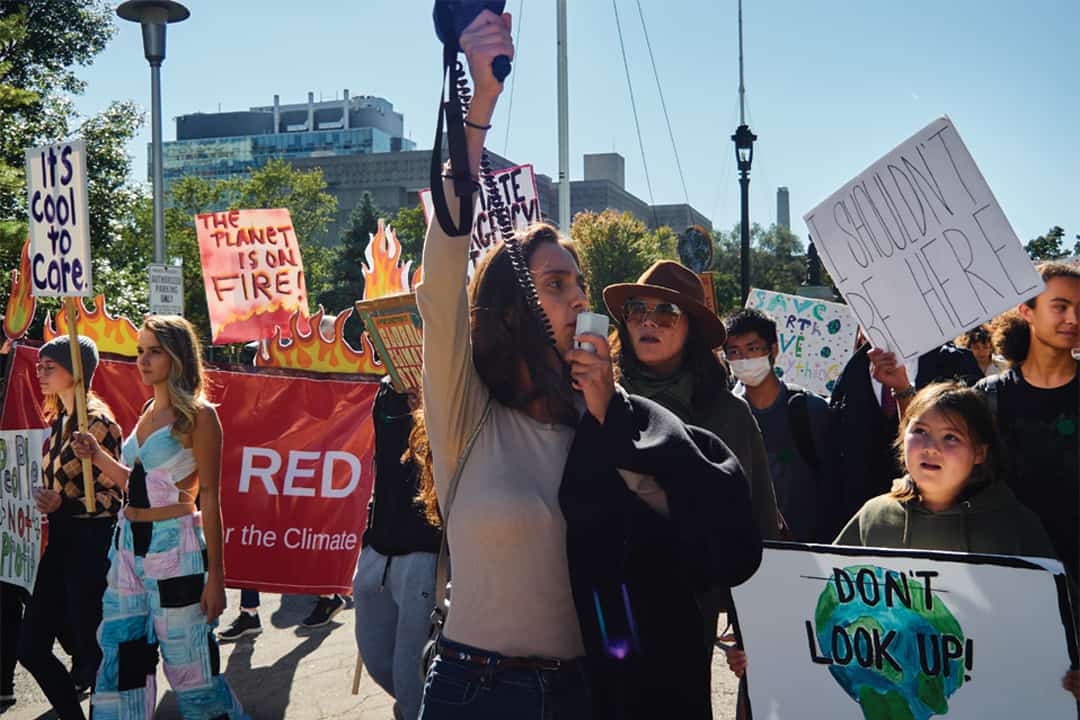On September 23, signs with “There is No Planet B!,” “We Demand Justice!,” and other outraged messages flooded outside of Sidney Smith Hall as part of the annual Global Climate Strike. Hosted by Fridays for Future Toronto and in collaboration with a few other student organizations, the strike served as a continual call out to the University of Toronto administration and their involvement — or lack thereof, really — in pursuing environmental action.
Among the crowd was Climate Justice UofT (CJUofT) — a campus student organization dedicated to advocating for a #FossilFreeUofT, and one of the major contributors to the organization of the strike on September 23. Here’s a look into one of the main drivers behind climate activism at U of T and why their role is more important now than ever before.
What is Climate Justice UofT?
Founded in 2016 and formerly named Leap UofT, CJUofT was created in response to President Meric Gertler’s original refusal to divest from the fossil fuel industry. Alongside its sister organization, Climate Justice Toronto (CJTO), the U of T club has since gone on to host numerous successful climate awareness events and protests, advocate for marginalized community rights, and much more, becoming one of the largest, most prominent environmental activism student groups on campus.
In an interview with The Varsity, Erin Mackey, a fifth-year student studying political science and environmental studies at UTSG, and one of the main coordinators for CJUofT, said that “Our main focus right now is on creating a fossil-free future at U of T.”
The organization has been a longstanding advocate against fossil fuels and an active critic of the nonrenewable energy industry’s chokehold on academic institutions like U of T — the university’s groundbreaking decision to divest last year is just one victory of that. According to Mackey, “[We] played a really critical role in U of T divesting last October, which [was] really exciting.”
Climate Justice UofT and advocating for fossil free research
But simply cutting off fossil fuel endowments is far from the end goal for organizations like CJUofT. If anything, the divestment has proven that U of T is capable of change — and CJUofT is ready to pounce on that.
According to Mackey, the next step for U of T is to stop accepting financing from fossil fuel companies, especially when that financing goes towards funding climate energy research. “It poses a clear conflict of interest and undermines the work these researchers are doing,” she contends.
“These fossil fuel companies funnel money into this research… [and] use that as a greenwashing tactic to turn to the public and say, ‘we’re investing in cleaner technologies and developing climate solutions,’ when their entire business model is to continue the production of fossil fuels. It’s extremely contradictory and does much more harm than good.” In other words, no money given, no money taken.
Fossil-free research is just one of multiple campaigns the organization is currently working on, and it has no intentions of stopping anytime soon. From pressuring the Federated Colleges to divest, to campaigning against the Royal Bank of Canada’s — one of the largest investors of fossil fuels in Canada — involvement and presence on campus, CJUofT mobilizes students to fight for their futures at the university, and speak up for environmental salvation. Most of all, it continues to prove why it’s so important that students advocate against climate injustice, especially when it comes to calling into question the integrity of their own universities.
Youth and climate activism
More often than not, youth are left out of the decision-making equation, and our opinions are thrown aside — despite us being the biggest stakeholders, the ones who will feel the future impact of climate change the most. Especially in issues like climate justice, our protests, criticisms, and advocacies often fall on deaf ears.
But when enough of us band together, we can’t be ignored. And U of T’s divestment is an example of that. “It is not something [U of T] would have done unless we did a lot of pressure and publicly push them,” Mackey remarked.
Rivka Goetz, an organizer at CJTO, agreed with Mackey in an interview with The Varsity: “Young people have to confront the future in a bigger way than anyone else. There is strength in numbers, especially for those of us who are part of influential institutions like U of T.”
Campus groups like CJUofT ensure that there are grounds for students to build a voice on, to come together and collectively rally for environmental justice. If these institutions are truly made for us, then we should have every right to decide how they are run. Like Goetz said: “Students are the university, and if enough of them call for action — especially a specific action like divestment — eventually the administration will have to listen.”
The Global Climate Strike on September 23 shows that there is still much to be done here at U of T in regards to environmental justice, and that student activism is one of the main drivers behind such progress. From CJUofT to student unions, to the multitude of other groups and clubs across campus, these organizations are here to advocate on our behalf. And at a time like now, that has never been more important.
And finally, to U of T itself: It’s past time.
For more information on CJUofT, or to get in touch, find their media pages at @climatejusticeuoft on Instagram and @cjuoft on Twitter.
Isabella Liu is a second-year student at Victoria College studying international relations, public policy and environmental studies. She is an associate comment editor at The Varsity.


